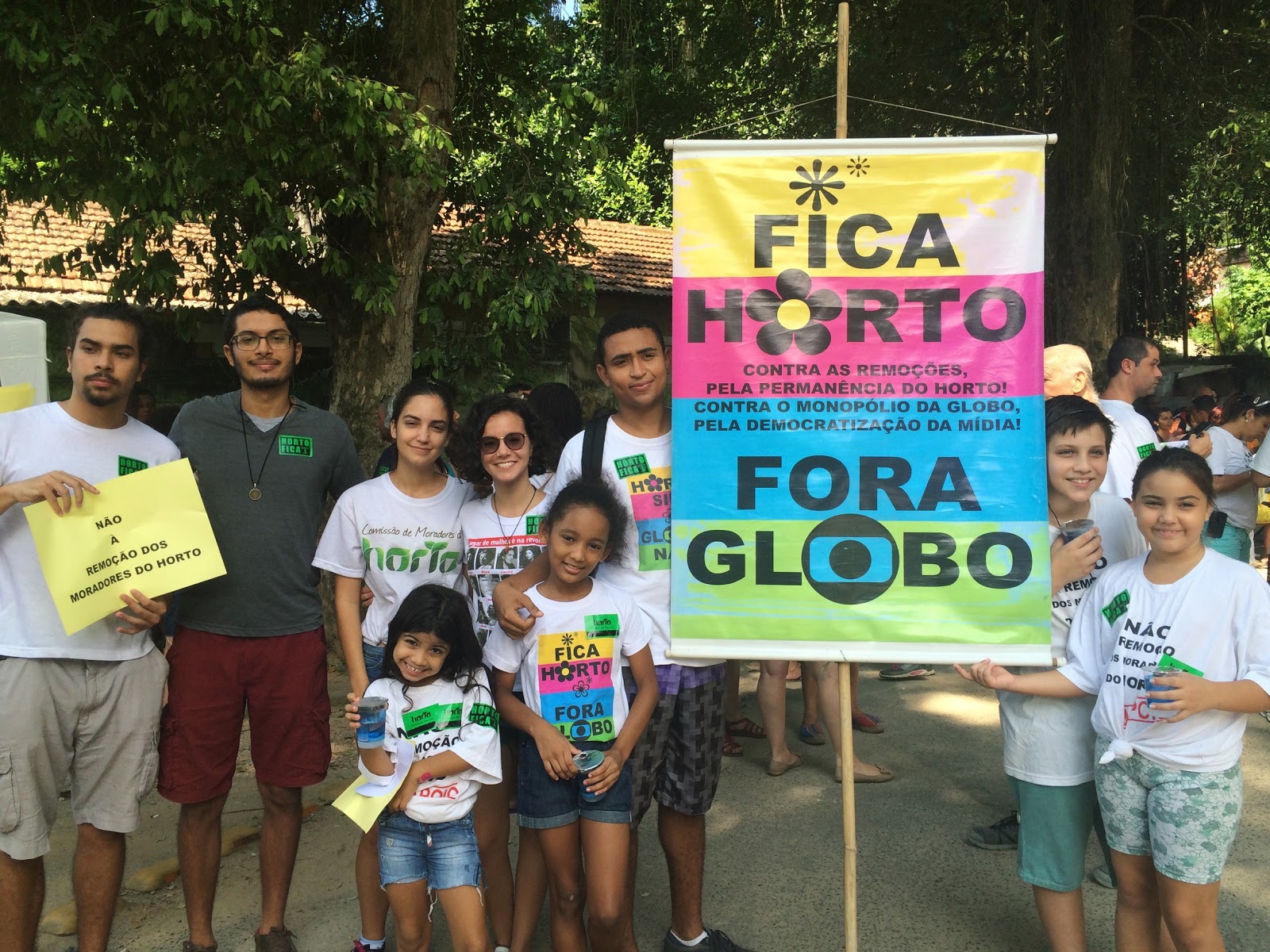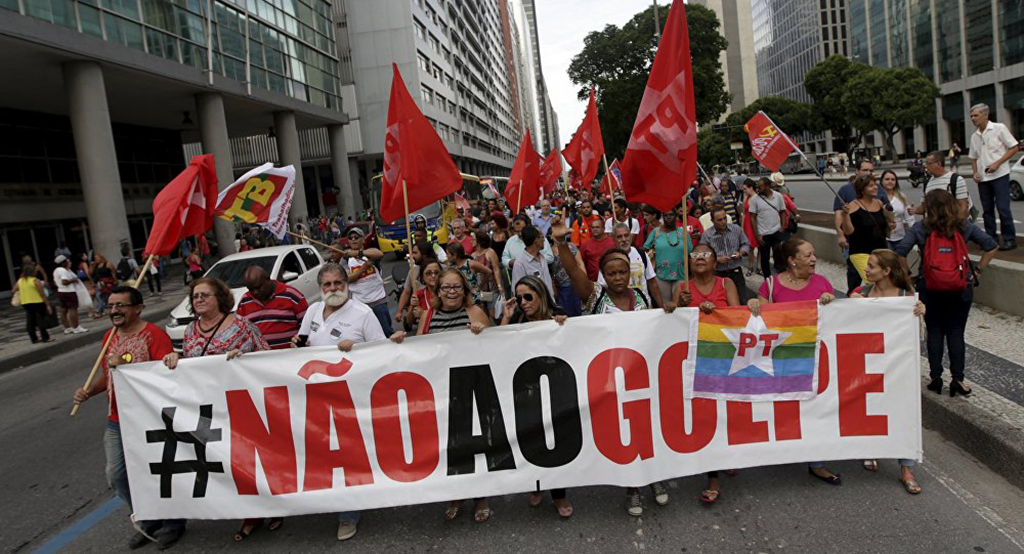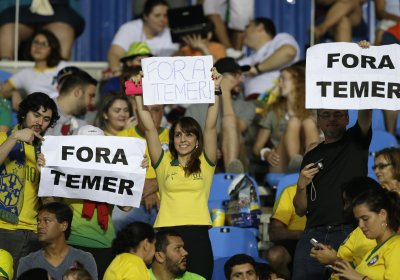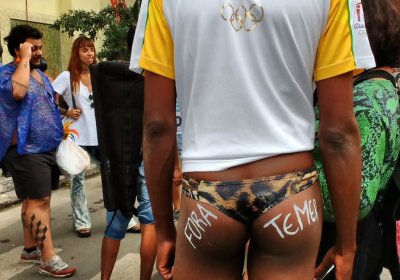Brazil's de facto president Michel Temer was sworn in on August 31, after the country's Senate voted to impeach suspended President Dilma Rousseff.
Brazil
 Residents of the favela of Horto protest against the imminent demolition of their community.
“I am absolutely convinced that history will talk of the Rio de Janeiro before the Games and the much better Rio de Janeiro after the Olympic Games,” said Thomas Bach, president of the International Olympic Committee.
Residents of the favela of Horto protest against the imminent demolition of their community.
“I am absolutely convinced that history will talk of the Rio de Janeiro before the Games and the much better Rio de Janeiro after the Olympic Games,” said Thomas Bach, president of the International Olympic Committee.
 Coca-Cola, McDonald's, Visa and the rest of the corporate sponsors of the August 5–21 Olympic Games in Rio de Janeiro won't be paying any taxes on the money they earn due to a tax exemption law that is set to cost Brazil hundreds of millions of dollars.
Coca-Cola, McDonald's, Visa and the rest of the corporate sponsors of the August 5–21 Olympic Games in Rio de Janeiro won't be paying any taxes on the money they earn due to a tax exemption law that is set to cost Brazil hundreds of millions of dollars.
 The US’s first Black swimmer to win a gold medal, Simone Manuel, dedicated her win to ending police brutality on August 11. Manuel tied with Penny Oleksiak from Canada at 52:70 to win gold in the 100 metre freestyle race at the Rio games that day.
The US’s first Black swimmer to win a gold medal, Simone Manuel, dedicated her win to ending police brutality on August 11. Manuel tied with Penny Oleksiak from Canada at 52:70 to win gold in the 100 metre freestyle race at the Rio games that day.
 Fans at Rio Olympics hold “Fora Temer” (“Temer out”) signs. August 10.
As Brazil’s media focuses its attention on the Rio Olympics, new revelations continue to shine a light on the glaring contradictions in the unelected government's efforts to impeach suspended President Dilma Rousseff for allegations of fraud.
Fans at Rio Olympics hold “Fora Temer” (“Temer out”) signs. August 10.
As Brazil’s media focuses its attention on the Rio Olympics, new revelations continue to shine a light on the glaring contradictions in the unelected government's efforts to impeach suspended President Dilma Rousseff for allegations of fraud.
Jorge Knijnik is a researcher at the Institute for Culture and Society at the University of Western Sydney, and specialist in sport and social justice issues. He spoke to Lalitha Chelliah from the Solidarity Breakfast Show on Melbourne community radio station 3CR on August 6 about the many social issues swirling around the 2016 Rio Olympics. Below is an edited and abridged transcript.
 Brazil has been hit by anti-government protests in the lead-up to the Rio Games.
When the 2016 Olympic Games began on August 5, it was the culmination of a harrowing, exhausting decade-long battle between the people of Brazil and the demands of those utterly unaccountable, scandal-plagued sports bodies, FIFA and the IOC.
Brazil has been hit by anti-government protests in the lead-up to the Rio Games.
When the 2016 Olympic Games began on August 5, it was the culmination of a harrowing, exhausting decade-long battle between the people of Brazil and the demands of those utterly unaccountable, scandal-plagued sports bodies, FIFA and the IOC.
Thousands of people from social and political movements in Rio de Janeiro continued to protest against the interim president of Brazil Michel Temer during the second day of the Rio 2016 Olympic Games.
An estimated 30,000 protesters gathered around the Maracana Stadium on August 5, where the opening ceremony of the games took place, but were met by security forces who managed to stop them from entering the stadium.
 Anti-coup rally in Brazil.
Since the start of the 21st century, the left has won elections in most Latin American countries in a powerful wave of popular rejection of the disastrous neoliberal policies of the previous regimes.
One must however distinguish between two quite different sorts of left governments:
Anti-coup rally in Brazil.
Since the start of the 21st century, the left has won elections in most Latin American countries in a powerful wave of popular rejection of the disastrous neoliberal policies of the previous regimes.
One must however distinguish between two quite different sorts of left governments:
More than two-thirds of Brazilians assess the coup government of acting president Michel Temer unfavourably and 32% think he is even worse than expected, a new poll by Vox Populi revealed on June 14.
Temer has been acting president since elected President Dilma Rousseff was suspended by Brazil’s Senate through an impeachment process viewed by many as a right-wing coup.
Temer was already a widely unpopular politician in Brazil. However, his first month as president and a series of unpopular measures, as well as a few scandals, have pushed his approval ratings even further south.
Ecuadorean President Rafael Correa spoke out on June 1 about efforts by right-wing political forces in Latin America to oust democratically-elected governments, saying that it would set a dangerous precedent for democracy in the region.
“Right-wing politicians don't just want to return to power, they want to return with a thirst for vengeance,” said Correa during an interview with Ecuador Public Television.
 I just returned to the United States from Rio de Janeiro, where I was researching a story on the Olympics in August for The Nation.
People spoke to me about the displacement and police violence that are accompanying the games. Yet one of the hottest points of discussion emerged from outside the country: a call to move, or at least postpone, the Olympics to prevent the global expansion of the Zika virus, currently exploding in Rio.
I just returned to the United States from Rio de Janeiro, where I was researching a story on the Olympics in August for The Nation.
People spoke to me about the displacement and police violence that are accompanying the games. Yet one of the hottest points of discussion emerged from outside the country: a call to move, or at least postpone, the Olympics to prevent the global expansion of the Zika virus, currently exploding in Rio.
- Previous page
- Page 10
- Next page



